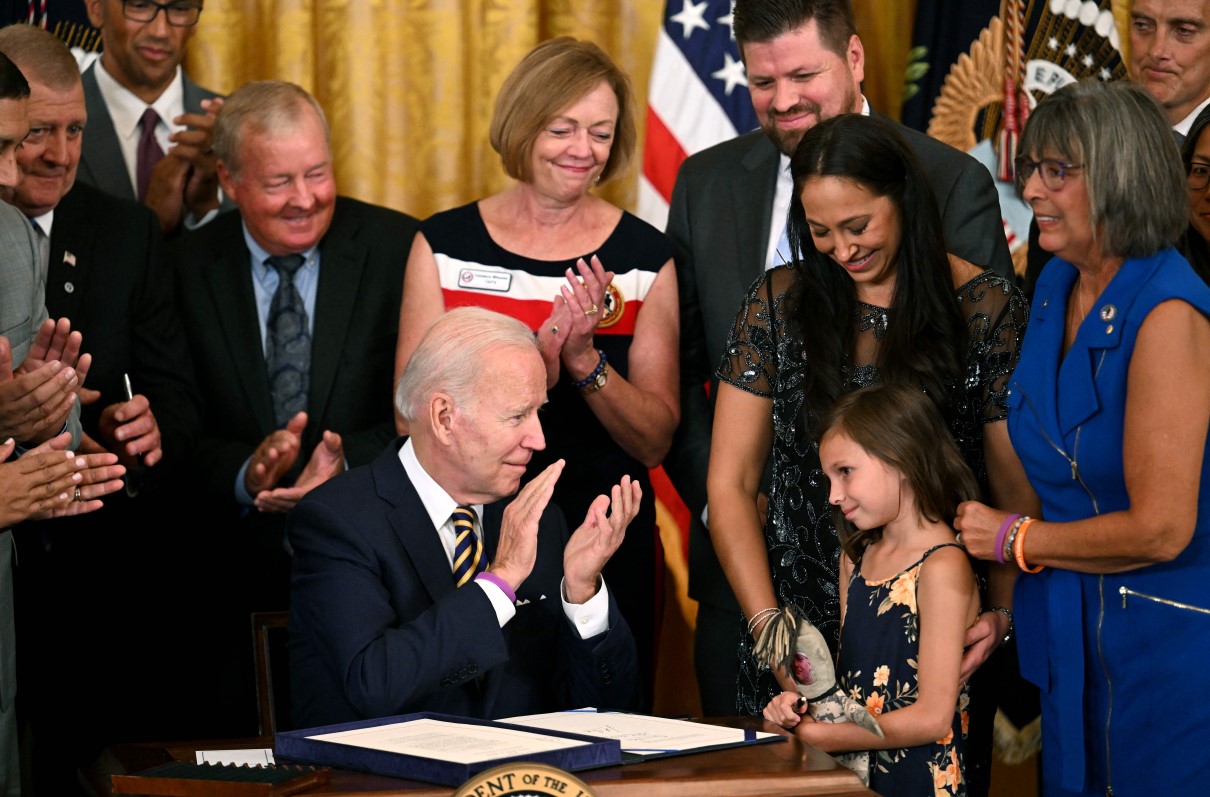A signing ceremony at the White House on Aug. 10 marked the end of a long legislative road to comprehensive toxic exposure reform, with the Sergeant First Class (SFC) Heath Robinson Honoring Our Promise to Address Comprehensive Toxics (PACT) Act of 2022 set to expand health care coverage to millions of veterans.
The bill’s passage came as part of a combined effort from MOAA and more than 60 other veterans service organizations, alongside veterans and their families, other advocates and advocacy groups, and a bipartisan group of legislators from both chambers.
The bill adds nearly two dozen conditions to a list of ailments presumed connected to toxic exposure by the VA; while the legislation includes a timetable for this change, President Joe Biden announced at the signing the VA will move to make these changes immediately. The bill also expands VA research into burn pit-related illnesses and improves VA’s screening process for those illnesses.
[RELATED: Veterans Can Start Filing Claims Now for PACT Act Benefits]
“It was a long-fought battle but in the end, this is a great outcome for our veterans,” MOAA President and CEO Lt. Gen. Dana T. Atkins, USAF (Ret), said before attending the White House event. “As much as our nation is divided, both politically and socially, this was truly a bipartisan agreement at the end of the day.”
In the days leading up the Senate’s passage of the bill, veterans, family members and advocates for the legislation also participated in a “Fire Watch” near the steps of the Capitol. Several bill supporters used social media to help amplify their message to the general public, as well as members of Congress.
“For too long, many veterans who got sick fighting for our country had to fight for their care here at home,” VA Secretary Denis R. McDonough said Wednesday at the signing ceremony. McDonough also issued a press release announcing veterans and family members can visit VA.gov/PACT for coverage details.
Before signing the bill, Biden praised the courage of Sgt. 1st Class Robinson’s family in seeing this legislation to the finish line. Robinson died in 2020 from lung cancer as a result of burn pit exposure in Iraq.
“I am just in awe of your family’s courage,” Biden said to Robinson’s widow, Danielle. “Through the pain, you found purpose to demand that we do better as a nation. And today we are.”
[RELATED: Your Questions, Answered: The Honoring Our PACT Act]
Cory Titus, director of Veteran Benefits and Guard/Reserve Affairs for MOAA, thanked MOAA members, Congress, and other veterans groups for their support of the bill. MOAA members sent 14,000 messages, including emails, letters, and phone calls, to legislators in support of the legislation.
“Politics is a team sport, and few communities know how to work together better than veterans,” Titus said. “Legislation like the PACT Act is what happens when veterans lock arms and unite to fix a wrong that has been decades in the making. MOAA advocates went into overdrive in the days leading up to passage. Their emails and calls were vital.”
Titus also thanked a series of legislators from both parties, to include House Speaker Nancy Pelosi (D-Calif.) and Senate Majority Leader Chuck Schumer (D-N.Y.); Veterans’ Affairs Committee Chairs Sen. Jon Tester (D-Mont.) and Rep. Mark Takano (D-Calif.) and ranking members Sen. Jerry Moran (R-Kan.) and Rep. Mike Bost (R-Ill.); along with the “relentless dedication” of Sens. Kirsten Gillibrand (D-N.Y.), Sherrod Brown (D-Ohio), Martin Heinrich (D-N.M.) and John Boozman (R-Ark.), along with Rep. Raul Ruiz (D-Calif.).
In addition, Titus recognized the efforts of Disabled American Veterans, Veterans of Foreign Wars, American Legion, Wounded Warrior Project, Iraq and Afghanistan Veterans of America, Vietnam Veterans of America, Burn Pits 360, Reserve Organization of America, TAPS, members of the TEAM (Toxic Exposures in the American Military) Coalition, and activists Jon Stewart and John Feal.
[RELATED: MOAA Urges Lawmakers to Pass Key Veterans Health Care Legislation]
Atkins said he is happy McDonough is already encouraging veterans to apply for benefits. The list of veterans covered by the bill includes post 9/11 veterans and those Vietnam veterans exposed to Agent Orange in Thailand, Cambodia, Laos, Guam, American Samoa, and Johnston Atoll.
“[The VA Secretary] recognizes that every hour we delay, we lose another veteran,” Atkins said. “And that, quite frankly, is unacceptable.”
Moran echoed that sentiment in a news release the day of the signing ceremony.
“From Vietnam veterans suffering from Agent Orange to the 3.5 million post-9/11 veterans exposed to burn pits during their deployments, our nation’s veterans and their families will no longer have to fear being turned away from the VA for illnesses connected to toxic exposure,” Moran said.
More Members Mean More Influence Over Our Health Care
Get involved and make sure your interests are addressed. Because the larger our voice is, the greater our impact will be.

